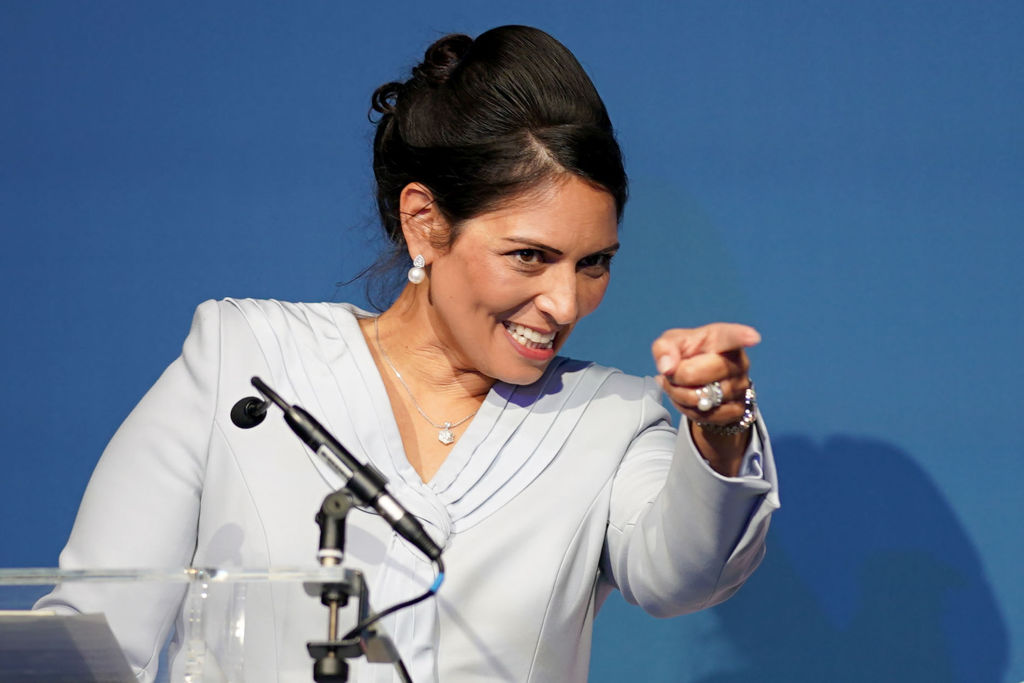The Conservative Party leadership contest is now well underway, with nominations closing tomorrow. Priti Patel yesterday became the fifth candidate to launch a public campaign, after James Cleverly, Robert Jenrick, Tom Tugendhat and Mel Stride, with Kemi Badenoch set to join the pack. As the party recovers from its worst ever electoral performance, the choice of leader could be a vital decision to steer the Tories between failure and a return to government. It’s unclear, however, quite what the dividing lines between the candidates will be.
The decision-makers in this election, first Tory MPs and then members, are a far smaller and narrower group than in the general election. They should agree on much more than they disagree, and ideological splits within the party are often overstated. More than that, the candidates are acutely aware of this. So far, rather than seeking to stand out, they are squabbling over the same ground.
A hard line on immigration is almost taken as a given in this contest. Even Tugendhat, viewed by many as the great moderate hope in this fight, has pledged his openness towards leaving the ECHR if it proves necessary to secure Britain’s borders. Having quickly identified the role immigration played in the Tory defeat and the looming threat from Reform UK, it is unlikely that there will be much deviation from the other candidates on this.
The same seems true of defence and foreign affairs. Both Tugendhat and Cleverly have military backgrounds and have held security and foreign policy-related briefs in government. They are likely to echo one another’s calls to properly fund defence and to take overseas threats seriously. With Tory members traditionally quite hawkish about Britain’s place in the world, the contest will surely coalesce on narrow differences.
Economic policy perhaps offers a little more scope for disagreement. The Tories have to accept that the deterioration in public and private finances was a big driver of their loss. The former is going to be driven home hard by the Labour Party as the leadership contest plays out, with attacks about “black holes” and poor finances coming thick and fast. It might, in some ways, draw something interesting out of the potential leaders.
The Conservative Party is perhaps more economically mixed than some expect. Boris Johnson, after all, won power with promises to restore much pre-austerity spending and with minimal promises on tax. There’s scope for a candidate to again capture that more high-spending Tory mantle — though it’s unclear if anyone other than Johnson could sell it to the members. Equally, with Liz Truss and her supporters largely out of Parliament, it is doubtful that anyone will swing into the contest with the same lust for free markets as the 49-day prime minister.
With the Tory Party reduced to a rump in Parliament, its capacity to produce a leader with new, radical thinking is seriously diminished. In a contest determined by members with a narrow set of often overlapping views, the incentives are to flatter them rather than strike out differently — for instance, Patel yesterday vowed to give grassroots Conservatives more say in policymaking. Right now, it’s hard to see just where the battle lines will be drawn. Even the old dividing line of Euroscepticism feels largely redundant.
This will be a contest in which most of the candidates are stressing their similarities rather than differences, trying to match with the Tory membership rather than surprise them. It may come down more to personality than politics — who the members feel can drag the party back to government. Perhaps the biggest difference will be who is most able to repudiate the previous leadership rather than risk being associated with its failure. For the party, the bigger question will be whether a narrow contest can bring out the ideas required to revive it.











Join the discussion
Join like minded readers that support our journalism by becoming a paid subscriber
To join the discussion in the comments, become a paid subscriber.
Join like minded readers that support our journalism, read unlimited articles and enjoy other subscriber-only benefits.
Subscribe